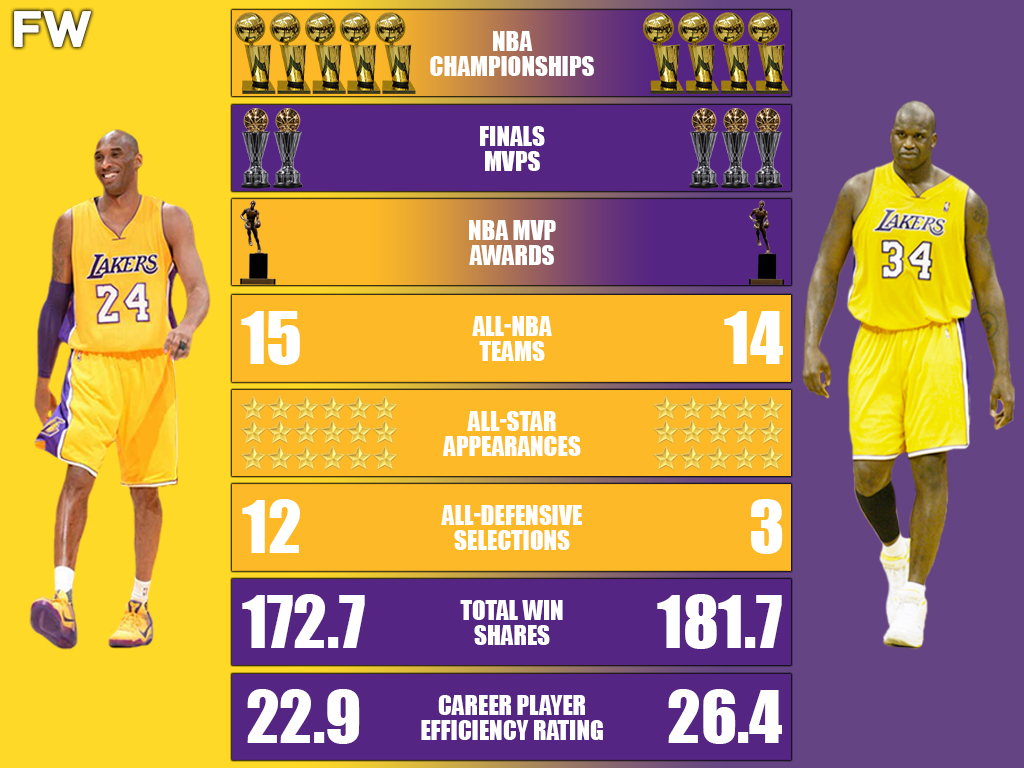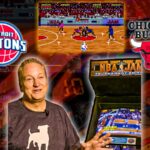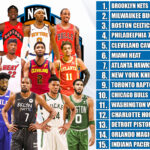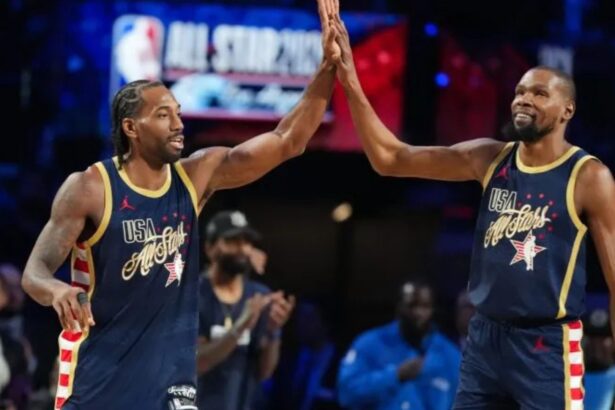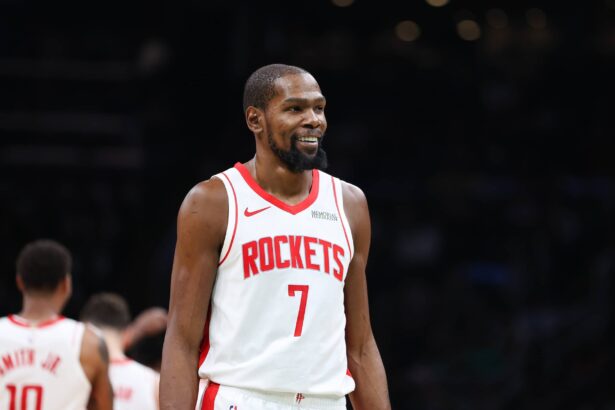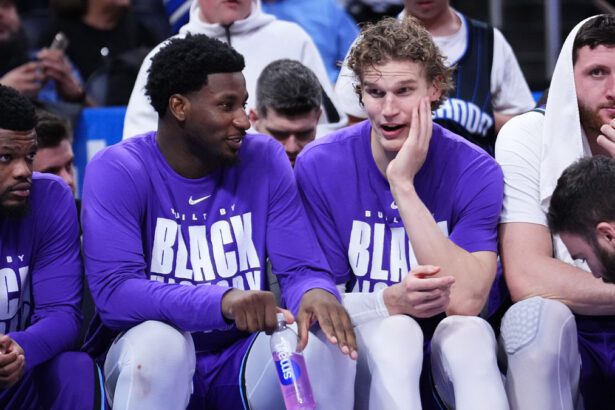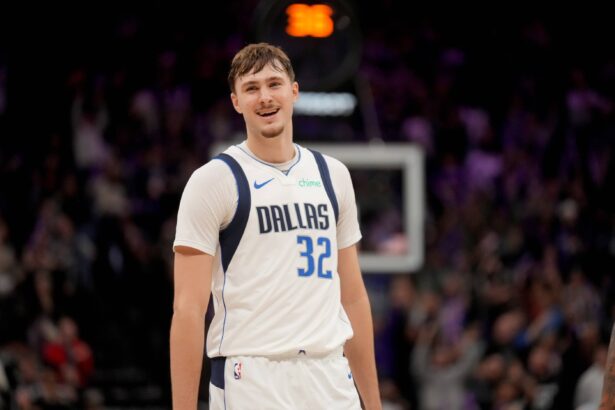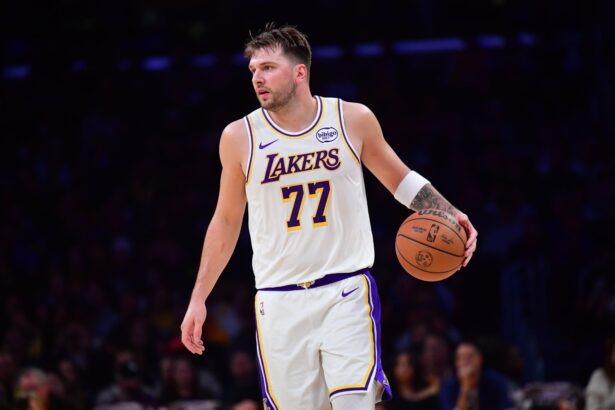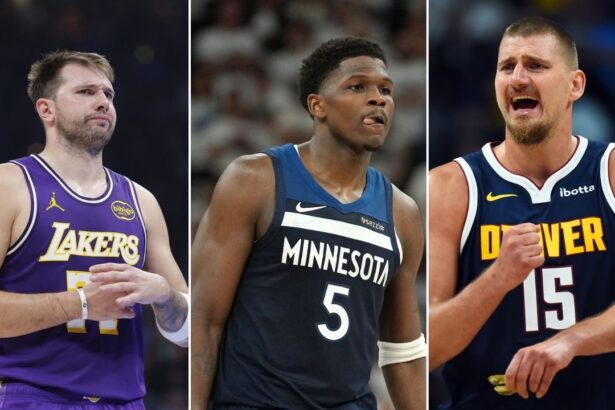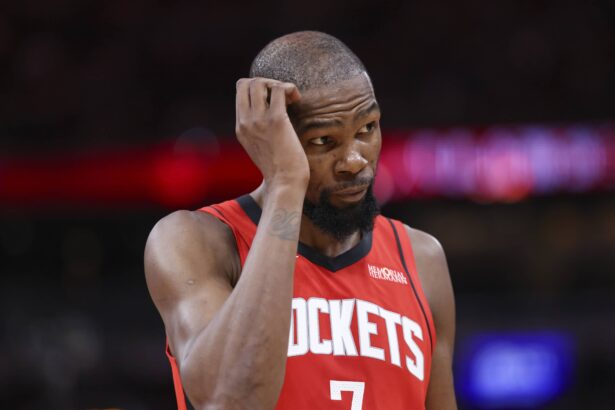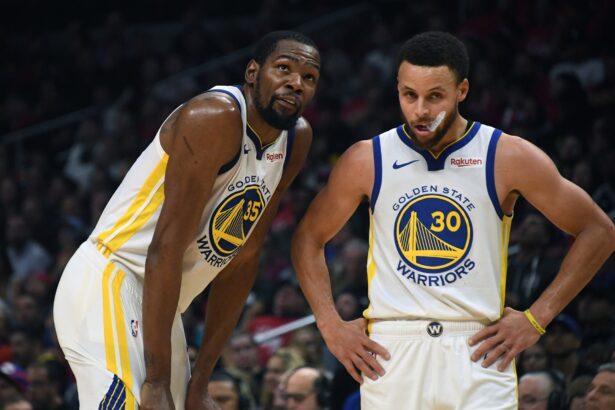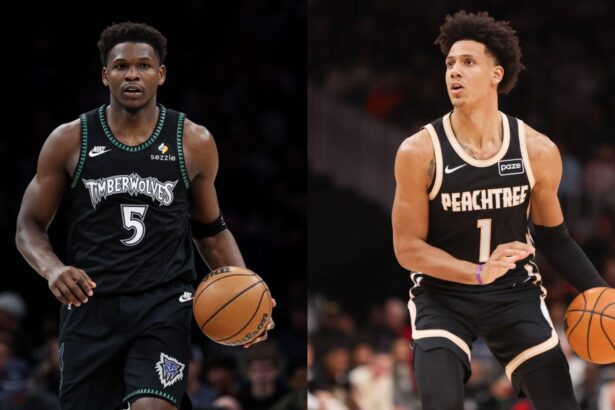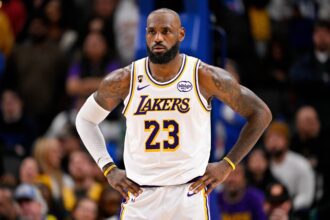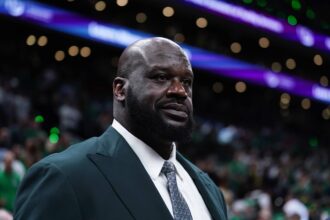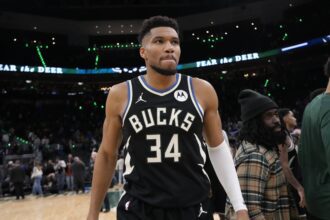There was a stretch in the 2000s where every household knew who Shaq and Kobe were. The two were the perfect match as they led the Lakers to a three-peat from 2000 to 2002. Some marriages don’t always last forever. In this case, the divorce was settled in 2004 when the Lakers chose to ride the rest of Bryant’s career while trading O’Neal to the Miami Heat.
- NBA Championships
- Finals MVP Awards
- NBA MVP Awards
- All-NBA Teams
- All-Star Selections
- All-Defensive Teams
- Total Win Shares
- Career Player Efficiency Rating
- Final Score
- Kobe Bryant vs. Shaquille O’Neal 4-3
- Kobe Bryant And Shaquille O’Neal Are The Top 10 Players Of All Time
- Next
- Kobe Bryant vs. Tim Duncan Comparison: Who Had The Better Career?
- LeBron James vs. Tim Duncan Career Comparison: 5 Championships Beats 4, But King James Has The Better Career And More Individual Accolades
- Stephen Curry vs. Kevin Durant Career Comparison: 4 NBA Championships Are Better Than 2
- LeBron James vs. Magic Johnson Career Comparison: 5 Championships Are More Than 4, But King James Has More MVP And Finals Awards
- Stephen Curry vs. Larry Bird Career Comparison: The Duel Between Two Legendary Shooters
Time heals all wounds. The two eventually worked out their differences and had a highly televised sit-down discussion with each other. From ego, and personality, to whatever else could manifest their feud, the two agreed they were both great players. That was because at the end of the day they were both Hall of Fame players that helped the Lakers build their historic trophy case.
If we had to look at careers and choose one over the other, it’s a tough conversation. The two players played two different positions. They were the leaders of their respective squads and won multiple championships. The all-time rankings pecking order is a conversation that never dies. Both players are in the top 10, but who has the edge over who?
NBA Championships
Kobe Bryant: 5 (2000, 2001, 2002, 2009, 2010)
Finals Record: 5-2
Shaquille O’Neal: 4 (2000, 2001, 2002, 2006)
Finals Record: 4-2
Bryant finished with one more championship than O’Neal despite there being a time when it looked like O’Neal was going to have the last laugh. When the Lakers completed the three-peat, it was O’Neal that won three straight Finals MVP awards during that time. Bryant was the second-best player for those teams. The Lakers made the NBA Finals again in 2004 but were upset by the Detroit Pistons. After that series, O’Neal was sent away.
O’Neal was traded to the Miami Heat and paired up with second-year star Dwyane Wade. The Heat nearly made the NBA Finals in 2005 but lost to the Pistons in the Conference Finals. The following year, Wade and O’Neal led the Heat to a championship over the Dallas Mavericks. Wade was named Finals MVP, but O’Neal had his fun on the victory tour, pointing out that he won a title without Bryant.
It took Bryant a near trade out of the Lakers and a midseason deal for Pau Gasol to launch his way back to the NBA Finals. The Lakers made the NBA Finals three straight seasons from 2008 to 2010. After losing to the Celtics in 2008, Bryant claimed Finals MVP in 2009 and 2010 to claim his fourth and fifth championships. The Lakers defeated the Magic and Celtics in those respective seasons.
Advantage: Kobe Bryant
Finals MVP Awards
Kobe Bryant: 2 (2009, 2010)
Shaquille O’Neal: 3 (2000, 2001, 2002)
Bryant shined when the Lakers repeated in 2009 and 2010. When the Lakers won in 2009, the team defeated the Magic in five games. In that series, Bryant averaged 32.4 points, 5.6 rebounds, 7.4 assists, 1.4 steals, and 1.4 blocks per game. He shot 43.0% from the field, including 36.0% from three-point range, and 84.1% from the free-throw line. His best game was in Game 1 when he scored 40 points to lead the Lakers to a win.
The 2010 Finals will go down as Bryant’s greatest moment. The series went to seven games, but the Lakers were able to grind out a win in Game 7. Bryant averaged 28.6 points, 8.0 rebounds, 3.9 assists, 2.1 steals, and 0.7 blocks. He shot 40.5% from the field and 88.3% from the free-throw line. Bryant led all scorers on both sides in six of the seven games.
While Bryant was the leader of those Laker teams, O’Neal was the leader of the three-peat. In 2000, he was the league MVP and then he claimed Finals MVP when he averaged 38.0 points, 16.7 rebounds, 2.3 assists, 1.0 steals, and 2.7 blocks in six games against the Pacers. It was a series that saw O’Neal shoot 61.1% from the field.
The following Finals against the 76ers saw Bryant averaged 24.6 points, 7.8 rebounds, and 5.8 assists, but it was O’Neal that won the Finals MVP with a stat line of 33.0 points, 15.8 rebounds, 4.8 assists, and 3.4 blocks while shooting from 57.3% from the field. When the Lakers finished the three-peat, O’Neal averaged 36.3 points, 12.3 rebounds, 3.8 assists, and 2.8 blocks in a four-game sweep over the Nets.
Advantage: Shaquille O’Neal
NBA MVP Awards
Kobe Bryant: 1 (2008)
Shaquille O’Neal: 1 (2000)
It took four years for Bryant to win an MVP after O’Neal left, but he eventually did it. Bryant averaged 28.3 points, 6.3 rebounds, 5.4 assists, 1.8 steals, and 0.5 blocks per game to win the MVP Award. Bryant was shooting all over the place this season. He led the league in field goal attempts and field-goal misses. With that said, the Lakers owned the best record in the Western Conference with 57 wins and a lot of that had to do with Bryant taking over games.
Many like to argue that Bryant should have won the MVP Award in 2006. That was the season that he scored his legendary 81 points and averaged 35.4 points per game. However, the Lakers had a poor position in the standings, so he finished fourth in the voting. His month of January that season saw him average 43.4 points per game.
O’Neal also won one MVP Award and that was during the 1999-00 season. O’Neal averaged 29.7 points, 13.6 rebounds, 3.8 assists, 0.5 steals, and 3.0 blocks per game. O’Neal led the league in total points and won the scoring race. His 57.4% shooting from the field led the league as did his 956 made field goals. This season goes down as legendary for the fact that he swept the win shares crowns in offensive, defensive, and total, as well as win shares per 48 minutes, value over a replacement player, and player efficiency rating.
Technically, this comes down to a stalemate, but if you had to pick the better MVP season, you would have to lean in the way of O’Neal. At the time, the center position was still highly used. O’Neal had the best season altogether in comparison to Bryant. Both players led their teams to the best record in the conference, but O’Neal proved that he was the best all-around player during the 1999-00 season.
Advantage: None
All-NBA Teams
Kobe Bryant: 15 (11 First Team, 2 Second Team, 2 Third Team)
Shaquille O’Neal: 14 (8 First Team, 2 Second Team, 4 Third Team)
Bryant made the First Team each year from 2002 to 2004. After a gap year, he made it every season from 2006 to 2013. He made the Second Team in 2000 and 2001 and the Third Team in 1999 and 2005. When you put it all together, Bryant was a part of the All-NBA Team every season from 1999 to 2013, which is 15 consecutive seasons.
O’Neal made the First Team in 1998 and then every season from 2000 to 2006. He made the Second Team in 1995 and 1999 while making the Third Team in 1994, 1996, 1997, and 2009. While Bryant owns one more All-NBA appearance, including three at the First-Team level, one has to remember that only one center was selected for each team, while two guards were taken. Bryant had three times more of a chance to make it than O’Neal and he still finished within one of Bryant.
Advantage: Kobe Bryant
All-Star Selections
Kobe Bryant: 18 All-Star Appearances, 4 All-Star MVP Awards
Shaquille O’Neal: 15 All-Star Appearances, 3 All-Star MVP Awards
Bryant nearly made the All-Star squad 19 consecutive seasons but missed the team in 1999 due to the lockout. He made his first appearance in 1998. He followed 1999 with 17 consecutive appearances from 2000 to 2016. That included being named the best player four times. One of those times, he shared the trophy with O’Neal.
O’Neal made the All-Star team every season from 1993 to 1998, which included starting during his rookie season. O’Neal played alongside Michael Jordan in the 1993 classic. After the lockout, he made the All-Star squad from 2000 to 2007 and then made one more appearance in 2009. O’Neal realistically missed the All-Star Game three times in his career if you don’t count the lockout season.
Advantage: Kobe Bryant
All-Defensive Teams
Kobe Bryant: 12 (9 First Team, 3 Second Team)
Shaquille O’Neal: 3 (3 Second Team)
The clear winner in this category goes to Bryant. With his 12 All-Defensive nods, he is tied with Kevin Garnett for the second-most by any player in NBA history. His 12 appearances are the most by any guard, while his nine appearances on the First Team are tied with Garnett, Michael Jordan, and Gary Payton for the most in league history.
O’Neal was not a poor defender. Again, you have to remember that one center was taken each time. From the 1992-93 season to the 2004-05 season, O’Neal averaged at least 2.0 blocks per game all but one time. O’Neal played in the same era as Dikembe Mutombo, Alonzo Mourning, and Ben Wallace. These were outstanding players that took a lot of places on defensive lists from other great players too.
Advantage: Kobe Bryant
Total Win Shares
Kobe Bryant: 172.5
Shaquille O’Neal: 181.7
Bryant wasn’t a double-digit win-shares player until the 1999-00 season. That started a stretch where he reached double-digit win shares in nine of the next 10 seasons. His best stretch came when he recorded his career-high 15.3 during the 2005-06 season, followed by 13.0, 13.8, and 12.7. Three times he led the league in offensive usage, topping 38.7% in 2006, which is why many believe there is an argument for him winning MVP in 2006.
O’Neal already has the advantage here with the higher number, but just to sweeten the pot, he led the league in total win shares two times, including back-to-back seasons. When he won the MVP in 2000, he led the league in offensive (11.7), defensive (7.0), and total (18.6) win shares. He led the league in win shares per 48 minutes two times, in 2000 and 2002, while leading the league in win shares again in 2001.
Advantage: Shaquille O’Neal
Career Player Efficiency Rating
Kobe Bryant: 22.90
Shaquille O’Neal: 26.43
There are only four players ranked higher than O’Neal on the efficiency chart. Those are Michael Jordan, LeBron James, Nikola Jokic, and Anthony Davis. Three of those players are active, so let’s see how those ratings finish when their careers are over. Bryant’s ranked 28th on the all-time list, which is a significant drop in comparison to O’Neal.
It makes sense why O’Neal has the advantage. O’Neal took most of his shots around the rim. He was a high-volume shot blocker. If you look at his field goal percentage and blocked shorts alone, it would make up for all the misses that Bryant had. Bryant has led the league in field goals missed and took a lot of erratic shots. He also was a shoot-first, pass-later player during the mid-2000s. That would not help with his efficiency rating, so O’Neal should easily win this category.
Advantage: Shaquille O’Neal
Final Score
Kobe Bryant vs. Shaquille O’Neal 4-3
Kobe Bryant And Shaquille O’Neal Are The Top 10 Players Of All Time
As previously mentioned, this was going to be a hard debate. These are two very solid players with a combined nine championships, 33 All-Star appearances, and 29 All-NBA nods. They were also teammates that helped lead the Lakers to three straight championships and will forever be etched in the history books when it comes to professional basketball.
O’Neal was the leader of the Lakers when Bryant and he played together. While the matter of ego is the reason the two built tension, which led to their divorce, you cannot hide from the fact that O’Neal was the best player on those teams. O’Neal had the offensive and defensive stats to prove it. He also won Finals MVP three straight times when the Lakers won. Bryant held a similar role that Scottie Pippen held when he played with Michael Jordan and helped the Bulls win six championships. It’s a role that is hard to play when you want to be the best yourself.
Bryant eventually did become the best himself. Bryant saw O’Neal win a title without him. There was chatter for at least one whole season about how Bryant was the villain. It was his fault that O’Neal left and some Laker fans even turned on him. It became all about Bryant’s shot selection and stat-stuffing instead of the overall complexion of the team. For some players, that chatter can detour their mindset. It can fog up their priorities. For Bryant, it never did. It just made him hungrier, almost exactly like Jordan when he came back from his first retirement.
What Bryant did by winning those two championships without Shaq was right up there with the three-peat in terms of amazement. The duo of Bryant and O’Neal was a more-stacked lineup over Bryant and Gasol. That tandem led the Lakers to three straight appearances in the Finals from 2008 to 2010. One of those times included a seven-game series against a very talented Celtics team that featured Paul Pierce, Kevin Garnett, and Ray Allen.
In the end, Bryant deserves his seat at the table as a top-5 player of all time and he slightly edges out O’Neal. Bryant finished with more championships, including winning more titles without his former teammate. Bryant finished with more All-Star, All-NBA, and All-Defensive selections as well. While O’Neal was a more efficient player, Bryant had the numbers and the rings to slightly one-up another top-10 player of all time.

